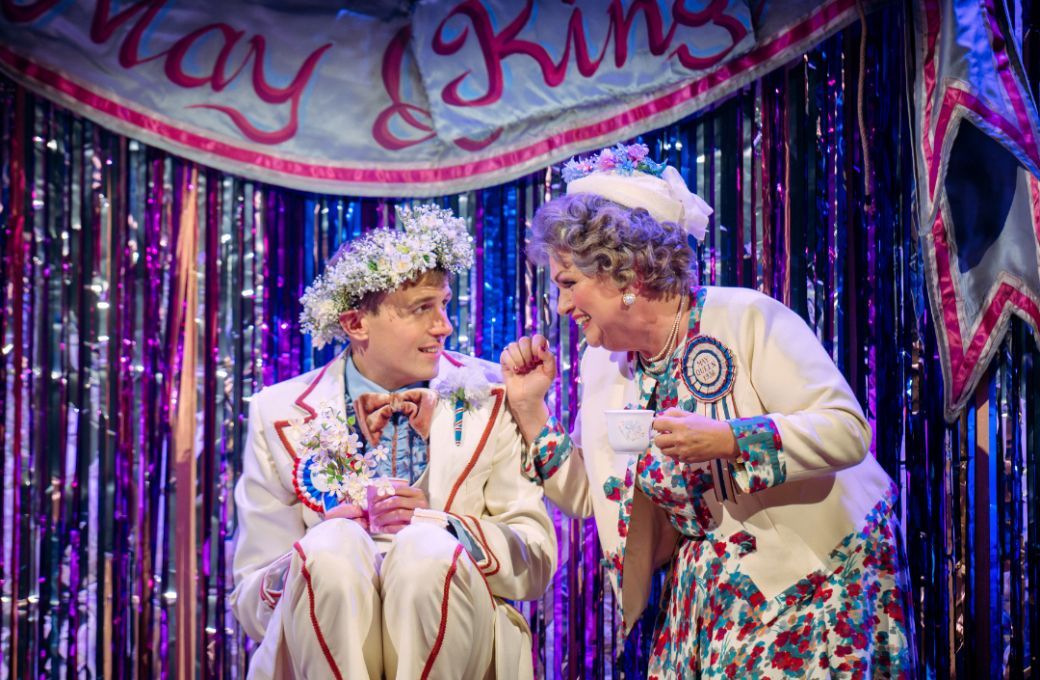Scottish Opera’s production of Albert Herring was a hit at Haddington’s Corn Exchange at September’s Lammermuir Festival, Britten’s delightful village hall opera performed in a village hall. A transfer to the bigger stages in Glasgow and Edinburgh for a tiny reprisal run was a welcome chance for audiences to catch Daisy Evans’ spirited production of this comparatively rarely performed piece. Scottish Opera has had years of experience taking opera to all sorts of small venues around Scotland, but with the tiny orchestra playing in Theatre Royal’s shallow pit configuration and the narrow front of stage set in place, this production felt perfectly adapted to the bigger space.
After The Rape of Lucretia, Britten was keen to write a lighter piece for his English Opera Group, his librettist Eric Crozier adapting a Guy de Maupassant short story which became Albert Herring. In both Peter Grimes and Albert Herring the cast are strongly drawn community characters, but while the fisherfolk on the Suffolk coast are anything but virtuous, there is a genuine innocence to the great and the good of Loxford. For today’s audience, a 1900 village fête where no local girls are considered pure enough to be crowned May Queen can be a bit of a stretch. Happily, the story of Albert’s youthful impetuous adventure set against intolerance of change is as fresh as dew on a May morning as Evans rolled the production forward to 1990.
Designer Kat Heath had fun with luridly bright-coloured costumes, and a superbly authentic functional but slightly run-down single-set village hall with its mismatched chairs, left scattered randomly by the Weightwatchers from the previous day. Leading the May Day committee and finely sung ensemble was Susan Bullock, a formidably pompous Lady Billows turning up the Wagnerian weight when required, Jamie MacDougall a brightly sung verbose Mr Upfold, the Mayor, trailing in her wake. Francis Church’s pleasing baritone cut through as Mr Gedge, the trendy vicar, while American soprano Kira Kaplan easily glossed her high notes as the teacher, Miss Wordsworth. Fellow American Jane Monari was the busybody Florence Pike, rather overshadowed by the orchestra at first, but Emerging Artist Edward Jowle with his resonant bass-baritone was a splendid Superintendent Budd, suggesting that grocer boy Albert Herring be selected as King of the May. The opening scene with Pike’s lists and village gossip was a comic delight, the ensembles as balanced and well-judged as the acting.

Emerging artists Ross Cumming and Chloe Harris delighted as Sid the butcher boy and Nancy from the bakers, impressively sung and confident in their stage presence as they conspired to slip a little rum into Albert’s lemonade. Mezzo Christine Sjölander as Albert’s mother, in this version with a crush on the policeman, completed the supporting principals, the three schoolchildren stroppy teenage girls. Although nicely sung by Sarah Power, Audrey Tsang and Clíona Cassidy, they were a trifle mature for the teacher’s song rehearsal, too over-worldly otherwise, perhaps the production’s only mismatch.
The performance revolves around Albert, brilliantly sung by Scottish tenor Glen Cunningham, his attractively light timbre and exciting top a perfect match for the part as he journeyed from shy mother’s boy to triumphant rebel. He completely inhabited the role, from put-upon fruit seller to the gawky, unwilling and wonderfully awkward May King. His own rebellious awakening, kindled by Sid and Nancy, and his disappearance to emerge as a triumphal unrepentant was done with a lot of fun.
The score is as characterful as the vocal music, Britten’s orchestration adding depth and colour, inviting us to scratch the surface of this comedy to discover underlying satire. It is as fascinating as anything on stage and Scottish Opera Orchestra’s 13 players – wearing Loxford Village Band waistcoats – were sharp and precise as conductor William Cole’s pointed baton. There were standout virtuosic turns from Sharron Griffiths (harp), Kate McDermott (clarinet), Elidh Gillespie (flute), Sue Baxendale (horn) and Ruari Donaldson (an array of deftly handled percussion). Cole’s approach was spirited and mischievously crisp in the scurrying about, the emotional peaks and the Tristan chord as Nancy pours the rum. The set-pieces were especially thrilling, the high drama, the speeches and the missing Albert all given full operatic treatment, the threnody deeply solemn. Albert’s final return with fewer of Lady Billows’ pounds in his pocket was joyous, the enjoyment of the cast infectious.


